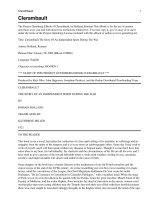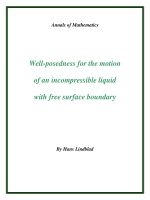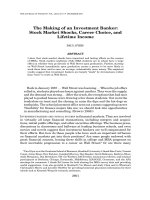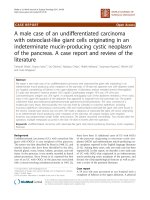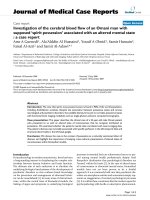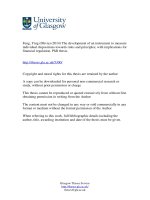Forsaken warriors the story of an american advisor with the south vietnamese rangers and airborne, 1970 71
Bạn đang xem bản rút gọn của tài liệu. Xem và tải ngay bản đầy đủ của tài liệu tại đây (2.77 MB, 255 trang )
Tai Lieu Chat Luong
Published in the United States of America and Great Britain in 2009 by
CASEMATE
908DarbyRoad,Havertown,PA19083
and
17CheapStreet,Newbury,Berkshire,RG205DD
Copyright2009©RobertL.Tonsetic
ISBN978-1-935149-03-3
Cataloging-in-publicationdataisavailablefromtheLibraryofCongressandthe
BritishLibrary.
Allrightsreserved.Nopartofthisbookmaybereproducedortransmittedinany
form or by any means, electronic or mechanical including photocopying,
recordingorbyanyinformationstorageandretrievalsystem,withoutpermission
fromthePublisherinwriting.
10987654321
PrintedandboundintheUnitedStatesofAmerica.
ForacompletelistofCasematetitlespleasecontact:
CASEMATEPUBLISHERS(US)
Telephone(610)853-9131,Fax(610)853-9146
E-mail:
CASEMATEPUBLISHERS(UK)
Telephone(01635)231091,Fax(01635)41619
E-mail:
CONTENTS
Introduction
Prologue
AFORTUNATESON
1
ASSIGNMENT:DELTARANGERS
2
“MOUNTAINSWEREBROUGHTFORTH”
3
“GOTELLITONTHEMOUNTAIN”
4
“DON’TLETTHESUNCATCHYOUCRYING”
5
“WE’VEONLYJUSTBEGUN”
6
“INTOTHEFORESTPRIMEVAL”
7
“THELONGANDWINDINGROAD”
8
“ANCHORSAWAY”
9
“JEREMIAHWASABULLFROG”
10
“INTOTHEMIDSTOFBATTLE”
11
“FIGHTINGSOLDIERSFROMTHESKY”
12
CLOSINGTHECIRCLE
13
REFLECTIONS
14
Epilogue
Glossary
Notes
Bibliography
For the brave U.S. and South Vietnamese soldiers who wore the Maroon and
RedBeretsoftheARVNRangersandAirborne.
INTRODUCTION
This book is about the author’s experiences as a Senior Advisor to South
Vietnamese Ranger and Airborne battalions during the latter years of the
Vietnam War. During the years 1970–1971, the withdrawal of U.S. forces
proceededatarapidpace,andtheRepublicofVietnamArmedForces(RVNAF)
wereassumingthemajorroleincombatoperationsthroughoutthecountry.The
story is written as a personal memoir of that period, but it is in no way
representativeofthetotaladvisoryeffortinVietnam.ThousandsofU.S.officers,
warrantofficers,andnon-commissionedofficersfromallbranchesofthearmed
services served in advisory capacities during the Vietnam War, along with
numerousciviliansrepresentingvariousgovernmentagencies.
Surprisingly, few have written about their experiences, leaving a gap in the
literaturethatneedstobefilledlestthelessonslearnedbeforgotten.Whileitis
doubtful that future counter-insurgency operations will involve the numbers of
U.S.combatforcesthatweredeployedinVietnam,itislikelythatsuchconflicts
will require the deployment of U.S. advisors to train and assist indigenous
forces.Hopefully,futureadvisoryeffortswillbenefitfromtheexperiencesofthe
MACVadvisors.
TheadvisoryeffortinSouthVietnambeganinthemid-1950s,organizedunder
the Military Assistance and Advisory Group (MAAG). In the early years, the
emphasis was on training and equipping South Vietnamese forces, and U.S.
advisorswereforbiddenfromparticipatinginadirectcombatrole,althoughthey
could accompany ground forces as observers and offer advice. The newly
organized ARVN Ranger units were among the first to benefit from this U.S.
advisory support. By 1961, the Communist insurgency had gained sufficient
strengthtoseriouslythreatentheDiemregime,andtheKennedyadministration
increasedthenumberofadvisorsto3,200.Ayearlater,U.S.militaryassistance
to South Vietnam was reorganized with the establishment of the U.S. Military
Assistance Command Vietnam (USMACV). Initially, priority was given to
assigningadvisorsattheprovinceandregimentallevels.Beginningin1964,the
programwasexpandedandfieldadvisorswereassignedtoselecteddistrictsand
combatbattalions.
The ramp-up in advisors continued in the ensuing years until all districts and
combatbattalionshadU.S.advisors.Theprogramwasfurtherexpandedin1968,
when advisory teams were deployed to assist territorial Regional Forces (RF)
andPopularForces(PF).By1970,thenumberofMACVfieldadvisorspeaked
at around 14,000, of which some 3,000 were serving with combat units at the
regimentalandbattalionlevels.
Thephase-downoftheadvisoryprogrambeganin1971.By1Julyofthatyear,
allBattalionCombatAdvisoryTeams(BCATs),withtheexceptionofAirborne
and Marine teams, were phased out. Over the next two years, the drawdown
continued and the U.S. MACV headquarters was disestablished in March of
1973,formallyendingtheadvisoryeffortinSouthVietnam.Thisbookprovides
justonesnapshot,amongmanythousands,oftheoveralladvisoryeffortduring
theVietnamWar.
RegardlessofwhenandwhereU.S.fieldadvisorsservedinVietnam,theyfaced
daunting challenges. Immersed in an alien culture with little or no familiarity
with the language, they provided much needed assistance to their South
Vietnamese counterparts, often in extremely dangerous and hostile
circumstances. With little external support, most served with distinction,
receivinglittlerecognitionfortheirefforts.
TheoriginsofthisbookcanbetracedtoamanuscriptthatIwrotein1971,atthe
conclusionof myadvisorytour.Themanuscriptwasnevercompletedandwas
putasideuntil2008,whenIdecidedtoexpanduponitbydoingfurtherresearch
on events that were such an important part of my overall Vietnam experience,
bringingasenseofclosuretothatperiodofmylife.
Researchforthebookwasadauntingchallenge,sincesurvivingrecordsarefew
incomparisontorecordspertainingtoU.S.unitsandtheiroperationsduringthe
VietnamWar.Mr.RichardBoylan,SeniorArchivistattheNationalArchivesand
RecordsAdministration,wasextremelyhelpfulinlocatingthoserecordsthatdo
existatthearchives.Organizationandcataloguingoftherecordsisstillawork
in progress. Other sources used in my research were found at the U.S. Army
Center for Military History, the Vietnam Center and Archive, Texas Tech
University, and the Moise Vietnam War Bibliography. Other sources can be
foundinnotesandbibliographysectionsofthisbook.
PROLOGUE
The Caribou’s twin Pratt Whitney engines roared to full power and the assault
airlift aircraft sped down the Ton Son Nhut runway. Gaining altitude over the
sweltering city, the aircraft banked south toward the Mekong Delta. The early
morningsunlightglistenedoffthelush,greenricepaddiesbelow.Minutesafter
takeoff,theCaribouflewoverthevillageofBinhTriDong.
Inthericepaddiesjustnorthofthevillage,Ispottedwhatremainedofthedirt
bermofanabandonedmilitaryoutpost.IrecognizeditatonceasthesiteofFire
SupportBaseStephanie,occupiedbythe199thInfantryBrigade’s4thBattalion,
12th Infantry during the May Offensive of 1968. Two years earlier, the rifle
company that I commanded defended the firebase and fought off determined
NorthVietnamesearmyassaultsinthesurroundingricepaddies.
My mind wandered back to May 1968. The now placid, emerald-green rice
paddiesborenotraceofthemanybravemenwhodiedheretwoyearsearlier.I’ll
neverforgetthathallowedground.ToomanyyoungAmericansdiedthere,some
under my command. I wondered if the families of the young NVA who died
thereeverlearnedoftheirfate.TherewerethetwoyoungteenageNVAsoldiers
that I captured after they ambushed one of my squads. Were they still
languishinginanARVNPOWcamp?SomeofthedespairIhadfelttwoyears
earlier surged back into my head. Put all that aside for now and focus on the
present,Ithought.You’regoingtowaragain.
OurdestinationwasCanTho,some100milessouthofSaigon.Myordersread,
CaptainTonsetic:assignedtoMilitaryRegion4,AdvisoryTeam96fordutyas
SeniorAdvisor,CaiCaiRangerCamp.MysecondcombattourinVietnamwas
underway.
CHAPTER1
AFORTUNATESON
FortBenning,Georgia,1969
Ninemonthsearlier,Iwaslivingmydream.I’dhadmyfillofwarin1968and
never intended to return to Vietnam. The Army did not press the issue in my
case. I was sent to Fort Benning near Columbus, Georgia, for the Infantry
Officers Advanced Course in 1969. My course began in January of that year.
That same month, American and North Vietnamese delegates squared off in
Paris,arguingovertheshapeofthetabletobeusedfortheirnegotiations.Itwas
alsothemonththatRichardNixonwasinauguratedforhisfirstterminoffice.I
sat transfixed in front of my TV on 20 January, watching as 300–400
demonstrators hurled rocks and bottles at our new commander in chief’s
limousine asit drove downPennsylvaniaAvenue.Weledalifeshelteredfrom
politics in Columbus. It was a typical southern army town that supported the
military,andwasproudtobe“thehomeoftheU.S.ArmyInfantry.”
Onthesamedaythatourcoursebegan,IsubmittedmyapplicationforaRegular
Army commission. At the time, the Army had two main categories of
professional officers: Regular Army and Reserve officers on indefinite active
duty.WestPointgraduateswerecommissioneddirectlyintotheRegularArmy,
whilemostROTCandOCSgraduateswerecommissionedasReserveofficers.I
wascommissionedthroughtheROTCprogramattheUniversityofPittsburgh,
andenteredthe Armywitha Reserve commission.Therewereadvantagesand
disadvantages to serving as a Regular. Regular Army officers usually received
more consideration for career enhancing assignments and selection for
attendance at Army schools, such as the Command and General Staff College
andtheArmyWarCollege.
Regular Army officers could also serve for 30 years before retirement, while
Reserve officers usually served for 20 years. It was almost impossible for an
officer to be promoted to full colonel or general officer in less than 20 years.
However,Regularofficershadtocompeteforpromotionintwosystemsinorder
toremainonactiveduty.First,therewastheArmyoftheUnitedStates(AUS)
promotion system. All officers on active duty competed for promotion in this
system.Itwasan“uporout”system,buteachofficerhadtwoopportunitiesto
competeforadvancementtothenexthighergrade.RegularArmyofficersalso
had to compete for promotion before Regular Army promotion boards.
Considerationcamealongonlyonceforeachrank.IfaRegularofficerwasnot
selectedforadvancementtothenexthigherrank,theofficerwasforcedtoleave
theArmy.TheonlyexceptioncameattherankofRegularArmymajor.Oncean
officerwaspromotedtothisrank,hewastenureduntilretirement.Thus,itwas
sortofadoublejeopardysystemforRegulars.SinceIplannedtomaketheArmy
mycareer,IwantedtobeaRegularArmyofficer.Whynot“goforthegold,”I
thought.Asitturnedout,Imadetherightdecision.Tenthousandcaptainswho
heldReservecommissionswereforcedtoleavetheArmyintheearly1970sas
partofaReductioninForce(RIF).
Along with 150 other captains, I sat through countless lectures on tactics,
logistics,intelligence,andothermilitarysubjectsthatweremeanttoprepareus
for future command and staff assignments. Surprisingly, the Army remained
focused on a possible war with the Soviets in Europe throughout the Vietnam
War. Most of the tactics instruction and map exercises were built around a
European scenario, such as a defense of the Fulda Gap, with armor and
mechanizedinfantryformations.Counterinsurgencywarfarehadalowerpriority
intheInfantrySchool’sProgramofInstruction(POI)atthattime.Itwasasifthe
ArmyhadalreadywrittenoffthewarinVietnam,andwasreadytotakeonthe
Red Army on the plains of Central Europe. Given the Soviet invasion of
Czechoslovakia in August 1968, this line of thinking was not entirely out of
touchwithreality.
EveryofficerintheclasshadatleastonetourinVietnamundertheirbelts,and
that nine-month course was a breather. I lived in a nicely furnished, off-post
apartment with all the amenities, including a swimming pool and clubhouse.
Most of us frequented the Custer Terrance Officer’s Club at the end of each
day’s instruction for happy hour. Friday night happy hours often lasted past
midnight, and after that there was always a party at a classmate’s off-post
apartment. As a 27-year-old bachelor, I was an eager participant in the social
activities.
Weatherpermitting,Ispentmyweekendsplayinggolf,loungingatthepool,and
waterskiingwithacoupleofbuddiesonthemuddyChattahoocheeRiver.Other
thanaplethoraofliquorstores,pawnshops,bars,andstripclubsthatcateredto
drunkenGIs,Columbushadlittleelsetooffer.Forme,itwasjustatemporary
stopleadingtomynextassignment.
When we submitted our assignment preferences—“dream sheets”—midway
duringthecourse,andIselectedGermanyasmyfirstchoice.I’dhadmyfillof
AsiaafteratourinThailandandVietnam,andI’dbecomeambivalentaboutthe
war. U.S. casualties continued to mount as the Paris peace talks dragged on.
Moreover,I’dalwaysdreamtofseeingEurope.Mostofmybuddiesscoffedat
me, believing that we were all headed back to Vietnam; they were about 98
percentcorrect.
A few days before we received our reassignment orders, we learned that
LieutenantWilliamCalleywastobeprosecutedforwarcrimescommittedatMy
Lai.ItwastheworststainontheArmy’sreputationsincethemassacreofNative
AmericansatWoundedKnee.MyLaididirreparableharmtoboththeArmyand
thewareffort.
IhadabsolutelynoempathyforCalley,andwasdisgustedandabhorredbywhat
happened there. Most of my classmates were of the same mind, with one
possible exception: Captain Ernie Medina, Lieutenant Calley’s company
commander. When Calley was charged, Medina dropped out of the course and
retainedF.LeeBaileyashisattorney.
IknewErnieprettywell.Infact,weoftensatnexttoeachotherduringclassesin
InfantryHall,andIwasinvitedtoThanksgivingdinnerathisfamilyquarters.It
washardtobelievethatErniewasinvolvedinthemassacreatMyLai,buthe
wasinfactthecompanycommanderandseniorofficerontheground.Captain
Medina was eventually court-martialed, but not convicted. Nonetheless,
realizinghiscareerwasover,heresignedhiscommissionandlefttheArmy.He
latertookajobatanaviationcompanyownedbyhislawyer,F.LeeBailey.
The My Lai affair had badly tarnished the image of the Army, especially the
officer corps, and I thought that was unfair, as did almost all of my
contemporaries.Duringmytourwiththe199thInfantryBrigade,weoperatedin
the heavily populated III Corps area and came in contact with civilians on an
almostdailybasis.Tomyknowledge,therewerenoatrocitiesevercommittedby
membersourbrigade,and I’msurethatheldtrueforthevastmajority of U.S.
units.
ItwasJuly,thesamemonththatNeilArmstrongand“Buzz”Aldrinlandedon
the moon, when we received our orders for our follow-on tours. I was one of
threeofficersinourclasswhoreceivedorderstoGermany.Mosteveryoneelse
was assigned to second, or in some cases third, tours in Vietnam. Needless to
say,mostofmybuddiesassumedIhadfriendsinhighplacesintheArmy.They
werewrong.
Actually, I received orders for Germany because I’d served back-to-back 12month tours in Thailand and Vietnam, and apparently the Army thought that I
neededabreak.MySpecialForcesassignmentinThailandwasnotconsidereda
combattour,buttheArmydidconsideritahardshiptour.Inmanywaysitwasa
prequel to my Vietnam assignment, since it provided me with valuable
experienceincounter-insurgencywarfareandtraining.
IdeployedwithCompanyDofthe1stSpecialForcesGroupfromFortBraggin
October of 1966. The company was redesignated as the 46th Special Forces
Company during my tour. In partnership with the Thai Special Forces, our
detachmentsspreadthroughoutthelargecountrytoquellagrowingthreatfrom
Communistinsurgentsinthenortheasternandsouthernregionsofthecountry.
My“A”DetachmentwaspartofDetachmentB-430,commandedbyLieutenant
Colonel Zoltan Kollat. In November of 1966, Detachment B-430 and its A
Detachments made a parachute jump into southern Thailand to establish a
counter-insurgencytrainingcampabout12milesfromTrang.Thecampthatwas
builtwiththeassistanceofanArmyengineerconstructionplatoonwaslocated
about60airmilesfromtheMalaysianborder.
Atthetime,therewasanongoingCommunistTerrorist(CT)insurgencyonboth
sidesoftheborder.AlongwithourThaiSpecialForcescounterparts,wetrained
regular Thai Army units before they were sent after the elusive CT units that
roamed the mountainous border area. Heavy emphasis was placed on live-fire
training, so we built several quick-reaction type jungle ranges to support this
training.
TheU.S.ambassadoratthetimedecreedthatwecouldnotcarryourweapons,
and we were ordered not to participate in combat operations. A Thai security
platoonwasassignedtoprotectthecamp,butwehadlittleconfidenceinthem,
soweworkedoutourownemergencydefenseplan.Itisnoteworthythatevery
Thai company we trained was later successful in tracking down Communist
insurgentsintheregion.WiththeexceptionofoneratheryoungCIAtypeanda
fewmissionaries,weweretheonlyAmericansinsouthernThailand.
OurBDetachmentCampwaslaternamedafteroneofourown,SergeantFirst
Class Billy Carrow, who died in an accidental shooting incident. Billy jumped
withthe503dParachuteRegimentonCorregidor,“TheRock,”in1945,during
theliberationofthePhilippines,andhewasanirreverentcharacterwholooked
like he just stepped out of a World War II Bill Mauldin cartoon. We all loved
him.
WehadmorethanonememberofourDetachmentwhoworegoldstarsontheir
parachutistwingsforWWIIcombatjumps.Itwasaveryprofessionalteam.In
early 1967, Lieutenant Colonel Kollat was assigned to lead a Task Force that
would train the first Thai unit to deploy to Vietnam, the “Queen’s Cobras”
Regiment.LTCKollat,theTaskForceSlickCommander,selectedmetobecome
a member of the Task Force Infantry Training Committee. The Regiment
received its initial training at Chon Buri, south of Bangkok, and completed
predeploymenttrainingatKanchanaburi,thesiteofthefamousBridgeoverthe
RiverKwai.
I did not accompany the Queen’s Cobras to Vietnam, opting instead for an
assignmentwiththeU.S.199thLightInfantryBrigadeinVietnam.Atthattime,
Special Forces was not a separate branch for officers, and in order to remain
competitive for promotion, you had to have command assignments in regular
infantryunits.
Prior to my Vietnam assignment, I was provided an opportunity to complete a
six-week course in jungle warfare at the British Jungle Warfare School in
Malaysia.IhadtogetacivilianpassportbecausetheMalaysiangovernmentdid
not want it known that U.S. military personnel were being trained in their
country,especiallythosewhowereheadedforVietnam.
IflewtoSingaporeandspentthenightatthehotelSingapura,sincetheRaffles
Hotel was out of my price range. The following day I took a taxi to the
Malaysianborderandenteredthecountry.Fromtheborder,Itookabustothe
school that was just outside Jahore Bahru. In order to keep a low profile,
Americans attending the school were issued British field uniforms. That took
some getting used to since the Brits wore woolen uniform shirts and heavy
trousers,despitethefactthattheschoolwasonlythreedegreesoflatitudefrom
theequator.
Cadre assigned to the school were from elite British regiments, such as the
Parachute Regiment, the Special Air Services (SAS) Regiment, or one of the
Gurkabattalions.Theofficersandtheirsergeantshadallseenactionduringthe
Malaysian insurgency, or in Borneo, where the Brits and Australians fought a
bloodylittlewarwithIndonesianforceswhoweretryingtoseizecontrolofthe
wholeisland.
The jungle warfare course was the best training experience I had as a junior
officer,barnone.TheonlythingIdidn’tlikeabouttheschoolwasthedresscode
intheofficers’mess.Theprescribeddresswasdarkciviliantrousers,long-sleeve
whiteshirt,andanecktie;adinnerjacketwasoptional.Traditionisimportantin
theBritishArmy,eveninthetropics.Onourfreeweekends,Iplayedpokerand
madetheroundsofthebarsinJahoreBahruwiththeBritishofficers.Itwasan
interestingexperience,andI’vebeenananglophileeversince.
FrankfurtGermany,1970
My assignment orders to Germany specified that I was to report to V Corps
headquarters in Frankfurt on 10 January 1970. The orders also indicated that I
was to attend the Army’s five-week Pathfinder Course at Fort Benning before
headingforEurope.TheArmy’sPathfindersparachutedintomarkdropzones
for airborne drops by larger units on major airborne operations. They also
organized helicopter landing zones, and served as air traffic controllers at
forward Army airstrips. There was one catch: the highest rank in a Pathfinder
Detachmentatthattimewasalieutenant.PerhapstheArmyjustwantedtokeep
mebusyuntilmyJanuaryreportingdateinGermany.Nonethelessitwasgood
training,andIlearnedafewthingsthatcameinhandylateron.Italsogaveme
thechancetomakeafewmoreparachutejumps.
AftergraduatingfromPathfinder School,IspenttwoweeksinPittsburghwith
myfamilyoverChristmasbeforeflyingtoEurope,whereIspenttheremainder
ofmyleaveinParisandLondon.Duringthosetwoweeks,Iliveditup.Ibooked
myselfintotheParisHiltonnearthebaseoftheEiffelTower.TheHiltonHotel
chainoffereda50percentdiscounttomilitarypersonnel.QuiteanicegestureI
thought. During the day I toured the city, and at night I sampled the Paris
nightlife,hittingthedivesonPigallebeforetakinginthelateshowattheMoulin
Rouge.
Thefollowingweek,IhoppedatrainthattookmetoCherbourg,whereIcaught
aferrytoDover.ItwasJanuaryandtheChannelwasrough,butneverthelessI
enjoyedthecrossing.IarrivedinLondonbytrainandtookataxitotheHilton
Hotel that overlooked Hyde Park. It was freezing cold and foggy during my
weekinLondon,butIhadablastblowingmostofthemoneyI’dsavedwhileI
wasinVietnam.
MyassignmentwithinVCorpswasadisappointmentbecauseIthoughtthatthey
would further assign me to one of its divisions, the 3d Infantry or the 8th
Infantry—that’swheremostinfantrycaptainswereassigned.Instead,thecorps
adjutant general assigned me to the G-3 Staff section of the V Corps
headquarters. It was housed in Frankfurt’s I.G. Farbin building that served as
GeneralEisenhower’sheadquartersrightafterWorldWarII.Lateritbecamethe
headquartersoftheU.S.VCorps.
TheI.G.FarbinbuildingislocatedinFrankfurt’sWestendNorddistrict,anditis
one of the few buildings in the city that survived the intense Allied bombing
raids during WWII. There were several other U.S. facilities located nearby,
including a family housing area, PX, and bachelor officer quarters. As far as
Frankfurt is concerned, the district surrounding the V Corps was one of the
betterareasofanotherwisedrabcitythatremindedmemoreofNewYorkthan
Germany.
ColonelJackGaustad,acrustyoldArmorofficerandWorldWarIIveteran,was
theG-3.Duringmyarrivalinterviewwiththecolonel,hepickedupimmediately
on the fact that I was a bachelor, and made a point of telling me that his
daughter, who was attending college in the States, was going to spend the
summerinFrankfurt.Nice,Ithought,shemustbearealloserifherfatherhasto
setherupwithoneofhisbachelorofficers.Well,asIfoundoutlater,Iwasdead
wrong.Thecolonel’sdaughterwasarealknockout,butbythattimeIwasinthe
processofleavingGermany.
MostofmyabbreviatedtourinGermanywasspentshufflingpapersintheI.G
Farbin building. Since all the other officers in the G-3 section were majors or
lieutenant colonels, I caught all the projects and duties no one else wanted. I
workedforcestructureissues;preparedtheFORSTATreadiness-briefingreport;
signedfor all theG-3vehiclesandtents;andwrotethecorpsannualhistorical
report. Instead of patrolling the Fulda Gap and training with the troops in the
snow at Hohenfeld and Grafoenwoehr, I was stuck in Frankfurt, completely
boredwiththetediumofstaffwork.
Fortunately,Ihadanableassistant,SpecialistPeterFlood,whocouldhavedone
bothourjobsstandingonhishead.Peterhadamaster’sdegreefromColumbia
andhadstartedhisownmoviecompanypriortobeingdrafted.Heactuallysold
acoupleofhisfilmstoamajorcompany.Iwasabitsurprised,however,when
hewalkedintotheofficeonedayandsaidheneededadayoff,ashewaspicking
up his new Porsche that he’d purchased. When I queried him how he could
afforditonaSpecialistFourthClasspay,hesaidhewaspayingcashforit.Iwas
still making payments on a ‘69 Pontiac at the time. That’s what I liked about
drafteearmy,itwasanamazingmixofcharactersandtalentfromallwalksof
life.
TheVCorpsheadquarterswenttothe“woods”acoupleoftimesduringalerts
while I was there. My immediate boss, Major Jim Gallagher, and I were
responsibleforsettingupthecorpsalternativecommandpostduringalertsand
fieldtrainingexercises.Thealternatecommandpostwouldtakeoveronlyifthe
maincommandpostwasknockedoutbyaSovietartilleryorairstrike,orwas
overrun.
On one alert, we moved by military convoy to the exercise area north of
Frankfurt and set up in a snow-covered pine forest. It wasn’t what I’d call
roughing it. We had expandable vans mounted on five-ton trucks and once we
gotourgeneratorsrunning,wehadlightsandheat.Allwehadtodowasmonitor
theradios,messagetraffic,andkeepoursituationmapsup-to-date.Onthethird
day,thethree-starcorpscommanderdroppedbyandtolduswhatagreatjobwe
were doing. To tell the truth, I was bored to death, but I knew there were
thousandsofGIsouttheresleepinginthesnowwhowouldhavechangedplaces
withmeinaheartbeat.
By spring I began to get restless. Living in bachelor officers’ quarters never
appealed to me, but German apartments were expensive, especially in
Frankfurt’sdesirableWestenddistrict.TherewereafewsingleAmericanwomen
thattaughtattheDODshighschool,andIhadacoupleofdates,buttheywere
few and far between. Since I didn’t speak the language it was practically
impossibletomeet,letalonedate,anyGermangirls.Infact,mostoftheeligible
girls in the Westend district were university students who were as anti-war as
theirU.S.counterparts.
Severalanti-wardemonstrationswereheldneartheU.S.facilitiesthatspring.I
watched one of the demonstrations from my BOQ window. There were about
1,000demonstrators.Afewmanagedtoclimbontotheroofofthebuildingthat
housedthePXandbeganwavingtheVietCongflagbeforetheGermanPoletzi
arrestedthem.Thosedemonstrationsbotheredme;notthatIwascompletelysold
onthewarinVietnam,butwewereinGermanytokeepIvanoffthebacksofthe
Germans.Makenomistakeaboutit:the400,000SoviettroopsstationedinEast
Germanyweren’twindowdressing.TheyposedarealthreattoWesternEurope
duringtheColdWar.
The following Monday I walked into my office, sat down at a typewriter, and
typedoutarequestforreassignmenttoVietnam.I’dagonizedovermydecision
all weekend over a bottle of Johnnie Walker Red. I figured it was my only
chanceofleavingGermanybeforemythree-yeartourwascomplete.
WhenIhandcarriedmypaperworktoColonelGaustad’soffice,helookedatit
and said, “Captain Tonsetic, this will never be approved and I’m going to
recommenddisapproval.”
I replied, “Yes sir, but you know by regulation that you’ve got to send it
forward.”
“That’strue,buttheGeneralwilldisapproveittoo,”thegruffcolonelanswered.
Actually,thecolonelwasn’tthatbadaguy,andbeforeIlefthisofficehemade
meacounteroffer.
“Captain Tonsetic, I can understand that as a young officer you might be a bit
bored with staff work, but you’re going to do quite a bit of it in your career.
What is it that you want? I can get you to an infantry battalion in one of our
divisions,ifyouwantthat.Justgiveyourcurrentjobanothersixmonths.”
Istillthinkhewantedmetohangarounduntilhisdaughtercameoverforthe
summer.Thecolonel’sofferwastempting,butIdidn’ttakethebait.Besides,I
knewfullwellwhatwasgoingoninthetroopunitsthroughoutGermany.Most
werefilledwithdrafteeswhosomehowescapedtheleveesforVietnam.Morale
waslow,andtherewereseriousdisciplineproblemsinmostbattalionscentered
on racial tensions and drug abuse. Inevitably, some of these problems spilled
over on the Germans. The crime rates in areas near U.S. bases skyrocketed.
Rapes, murders, and robberies—allegedly perpetrated by American GIs—were
splashedallovertheGermannewspapers.
“Sir,I’vethoughtaboutthisforweeks,andIthinkthatwhentheArmyisatwar,
aninfantryofficershouldbeinthetheaterofwar,”Ireplied.SinceI’dalready
playedtheVietnamcard,Iwasn’tabouttobackdown.
“Your point is well taken captain, but the Army will do the right thing, and I
thinkyou’llbestayingwithus,”thecolonelconcluded.
AttheendofApril,PresidentNixonshockedthenationwhenheannouncedthat
he’d authorized U.S. troops to invade Cambodia. Probably too little too late I
thought.Ifwe’dhavegoneintoCambodiarightaftertheTetOffensiveof1968,
when we had Charlie on the ropes, we might have won the war. I still hadn’t
heardanythingonmyrequesttoreturntoVietnam.
Four days later there was a student demonstration at Kent State, and the Ohio
NationalGuardshotandkilledfourstudentsandwoundednineothers.Thiswas
disturbing to me for many reasons, some personal. I had two sisters who were
studentsatPennStateUniversity,andhopedthattheyhadenoughgoodsenseto
stayclearofanydemonstration.
Ibegantothinkthatmytransferrequestwas“deadinthewater,”soIgrittedmy
teeth and went back to work. Two weeks later, I was at the corps motor pool
inventoryingallthevehiclesandequipmentIsignedforwhenthewarrantofficer
inchargeofthemotorpoolwalkeduptomeandsaidthatIwastoreporttothe
corpscommanderinhisoffice“pronto.”Shoot,Ithought,whathaveIdoneso
wrongthatthecommandinggeneralwantstoseemepersonally.
Lieutenant General Hutchin was the V Corps Commander at the time. I’d met
the general a couple of times while going through receiving lines at social
events, and he did swear me in when my Regular Army commission was
approved after I arrived in January, but as a lowly captain, our paths rarely
crossed.BeforeIreportedtothegeneral,Ihadtoreporttohischiefofstaff,a
brigadiergeneral.
“Tonsetic,whatdoestheoldmanwanttoseeyouaboutanyway?”thebrigadier
queried.
“IhavenoideaSir,”Ireplied.
“Neither do I,” he said, pointing to the door of the commanding general’s
office.”
TakingadeepbreathIknockedonthedoorandwassummonedbythegeneralto
enter his rather small, inauspicious office. After saluting and reporting in the
prescribed manner, General Hutchin, a courtly gray-haired man, pointed to a
leathereasychairbesidehisdesk.
“Haveaseatcaptain,”hesaid.
This is going to be some bad news, I thought, wondering if there had been a
deathinmyfamilyorsomething.
“I’vegotyourrequesthereforreassignmenttoVietnam,what’sthisallabout?”
IusedthesamelogicIusedwiththecolonel.
“Sir,asaninfantryofficer,Iwanttogotothesoundofguns.”Itcameacrossas
kindofcornytome,butthegeneral’searsperkedup.
“Well,IwasinthesamesituationasyouwhenIwasacaptain.IservedinWorld
WarIIasayounginfantryofficer,andwhentheKoreanWarbrokeout, Iwas
stuckinastaffofficer’sjobintheStates.IvolunteeredforKoreaforthesame
reasons. I’m going to approve your request and send it on to Washington,” he
saidashesignedmypaperwork.“Goodluckcaptain,”heintoned.
“Yes Sir, thank you Sir,” I replied. I stood up and assumed the position of
attentionandsaluted,knowingtheshortinterviewwasover.
IfoundoutlaterthatthegeneralwastwiceawardedtheDistinguished Service
CrossinKorea.Itwasgoodtoknowthatatleastonelieutenantgeneralstillhad
somemudonhisboots.
It took two more months for my paperwork to get through the Army officer
personnelsystem,butbytheendofJune,IhadmyordersforVietnaminhand.
Intheinterim,IboughtmyparentsaplanetickettoGermanysothatwecould
tourEuropetogether.Myfatherwasahardworkingsteelworkerwhowentinto
themillsrightoutofhighschool.Heandmymothersomehowmanagedtoraise
fivechildren,sendingfourtocollege,allonhisrathermeagersalary.Withthe
assistance of a partial scholarship, I was the first to graduate. My parent’s
expectationswerethatIwouldfulfillmytwo-yearcommitmenttotheArmy,and
then settle down to raise a family and pursue a civilian career. They didn’t
question my decision to remain in the Army, but I felt that I had somehow let
them down. Their visit was my attempt to assuage some of my self-imposed
guilt. I took a two-week leave to drive them to Switzerland, Rome, Italy, and
Paris,France.MyfatherwasadevoutCatholic,andattendingMassatSt.Peters
BasilicaintheVaticanwasthedreamofalifetime.Ifiguredmyparentsearnedit
afterworryingaboutmewhileIwasinVietnamthefirsttime.NowIwasabout
toputthemthroughitalloveragain.Theyneverquestionedmydecision.
Itooka30-dayleaveintheStatesbeforeleavingforVietnam.Duringmyleave,
Ialmostbecameengagedtoahigh-schoolclassmate,butIbackedoutatthelast
moment.IpromisedtomeetherinHawaiionrest-and-recreation(R&R)leave,
butasitturnedout,thatneverhappenedeither.JackiedrovemetotheGreater
Pittsburgh Airport for my flight to San Francisco, where I was scheduled to
catchaflightfromTravisAirForceBasetoVietnam.
As we pulled into the airport parking lot, the car radio was playing John
Denver’stune,“I’mleavingonajetplane,don’tknowwhenI’llbebackagain.”
Webothhadtearsinoureyesasweunloadedmybaggage.Wesharedaloving
embrace at the gate, promising that we would remain faithful, and reassuring
eachotherthatbetterdayswereaheadforus.AstheairlinertookoffIstaredout
thewindow,wonderingifI’deverseemyhometownagain.
Saigon,September1970
AfterreportinginatTravisAirForceBaseinSanFrancisco,Ilearnedthatmy
flight to Vietnam would depart the next day. It was an Airlift International
charterflightthathadalltheamenitiesofacommercialairlineflight,exceptfor
thebooze.AftercheckingintoatransientBOQ,IwalkedtotheTravisofficer’s
clubforadrinkanddinner.Imettwootherofficersatthebarwhowerealsoon
theirwaytoVietnamforthesecondtime.Allthreeofuswereallbookedonthe
sameflight.
Thenextmorningwemadeourwaytotheterminalacoupleofhoursbeforeour
flight was scheduled to depart. It took that long for the Army and Air Force
personneltocheckourbaggage,makesurewewereonthemanifest,andcallthe
roll a half dozen times before giving us permission to board the flight. My
travelingcompanionsandItookourtimeboarding,sinceitwascustomaryfor
officerstoboardlast.Wewerefortunatetogetarowofseatsattheveryfrontof
theaircraft.Theairlinestewardesses(that’swhattheywerecalledinthosedays)
satonfold-downjumpseatsacrossfromus.Theyweren’tbadlookingIthought,
tryingnottostare.Asitturnedout,thestewardesseswereveryfriendly,andwe
enjoyed their company throughout the flight when they weren’t busy serving
meals.Ourinnocentflirtationswerenodoubtmildcompared towhattheircoworkerswereputtingupwithintheaftsectionoftheaircraft,wheremostofthe
lower-rankingtroopswereseated.AfterrefuelingstopsinAlaskaandJapan,we
landed without incident at Bien Hoa airbase on the evening of 2 September
1970.
Unlikethebleary-eyedtroops,whowerebeginningtheirfirsttour,Iwasfairly
relaxed.AsYogiBerrasaid,itwas“déjàvualloveragain”forme.Ourkhaki
uniformswerealreadysoakedwithsweatbythetimeweboardedtheolive-drab,
40-passenger Army busses that would transport us to the 90th Replacement
DetachmentatLongBinh.
AnMPJeepwithamountedM-60machinegunpulledinfrontofourconvoyto
lead the way. Darkness descended as the convoy began to roll. The busses
followedalmostthesameroutethatmyinfantrycompanyfollowedonthefirst
nightoftheTetOffensiveof1968,butInotedthatthelandscapehadchanged.
Part of the route took us through a portion of a rubber plantation, but it was
hardlyrecognizablesincemostoftherubbertreeshaddisappeared.Romeplows
hadpushedthetreelinebackseveralhundredmetersonbothsidesoftheroad.
TheARVNPOWcamp,wheremyfirstplatoonfoughtoffadeterminedenemy
attackduringthefirstdayofTet’68,wasstillthere.
When we reached Highway 13, our transport turned south and headed in the
directionofSaigon.WepassedthemaingateofCampFrenzell-Jones,themain
basecampofmyoldoutfit,the199thLightInfantryBrigade,andthegateofthe
II Field Force headquarters. Both installations came under artillery fire and
groundassaultsduringtheearlymorninghoursof31January1968.Atthesame
time,CharlieCompany,4-12Infantry,theunitthatIcommanded,wasfightinga
desperatebattlewithabattalionofthe275thVCRegimentjustafewkilometers
tothenorth.Afloodtideofmemories,somenotsogood,rolledthroughmymind
aswespeddownthehighway.
Moments later our convoy rolled through the gate of the 90th Replacement
Battalion. Nothing much had changed in the past two years. It was a curious
placewheretheoldmixedwiththenew.TroopsdepartingVietnamwereeasily
distinguishable from those that had just arrived. First, while most were still in
theirearlytwenties,thedeparteeshadalltheyouthandvigordrainedfromtheir
bodies.Withsunkeneyesandfar-offstares,thecombatvetslookedthreetimes
their age. Twelve months in Vietnam had made them old in body and spirit
beforetheirtime.Ontheotherhand,theirreplacementslookedlikeadolescents
startingtheirfirstdayinhighschool,wideeyed,halfscaredtodeath,andfullof
falsebravado.
We stopped at a building where we presented our assignment orders and were
instructed to fill out personnel data cards, the usual stuff—name, rank, service
number, and who to notify in case we were KIA. Then we converted our
“greenbacks” for military payment certificates (MPC). U.S. greenbacks were
highly sought after by the Vietnamese, and were worth more than their face
valueontheblackmarket.Afterexchangingourmoney,wewereissuedbedding
and pointed to our temporary lodgings, the officers going in one direction, the
enlisted soldiers in another. I ended up in the same temporary barracks that I
stayedinbeforemydeparturein1968.Oncemore,thebunknumberassignedto
mewasthesameoneIhadsleptinbefore.Itwasasifmylifewasrunningin
reverse.
The next morning we finished our processing, and the officers who were
assigned to U.S. units departed to join their units, while those of us who had
orders to MACV advisory detachments awaited transport to the MACV
replacement center in Saigon. When I volunteered for my second tour, I
requestedassignmentasanadvisor.I’dalreadyconcludedthatthiswarwasno
longerourfight,andIdidnotwanttoseeanotheryoungAmericansoldierkilled
ormaimedforlifeinawarthatournationnolongersupported.
Ourgroupofabout30officerswenttolunchatthe90thReplacementBattalion’s
officersclub,wherewespentacoupleofhourswaitingforarepresentativefrom
our new command, MACV, to show up with our transportation. Finally, an
unkempt looking soldier walked into the club looking for his passengers. He
announced that his bus had broken down in route, and had to wait for a
replacement vehicle. I figured he’d probably stopped at one of the Vietnamese
carwashesthatlinedthebusyhighwaybetweenSaigonandLongBinh.Atone
of these car washes, a GI could get his truck, Jeep, or bus washed while he
downedabeer,boughtoneofthe“hostesses”aSaigontea,andnegotiatedwith
theproprietorfor20minutesofprivatefemalecompanionship.
We boarded our transport and sped down the highway toward the capital. Not
much had changed in the landscape. Rice paddies stretched as far as the eye
couldseeonbothsidesoftheroad.Farmerswearingthetraditional,loose-fitting
black pajamas and conical straw hats worked their fields behind their water
buffalos,andwomenattiredinshapelessblacktrousersandwhitetunicswalked
alongthedikeswithbasketssuspendedfromlongpolesacrosstheirshoulders.
Thereweretin-roofshantiesscatteredalongthehighway,withamopedortwoparked outside. Barefooted children played among the few scrawny chickens
thatpeckedawayinthedirtoutsidetheirdwellings.
ThetrafficalongthehighwaywasheavierthanIrememberedwithanassortment
ofarmyvehicles,dilapidatedciviliantruckscarryingbasketsofrice,vegetables,
and firewood, along with an occasional old Renault or Citroen, and an untold
number of motor scooters. All of these conveyances were driven “pedal to the
metal”onthelong,straight-openstretchesofthehighway.
As we neared the city, we drove past areas where thousands of refugees were
living in squalor. Many lived in large cardboard boxes and cartons scattered
among piles of garbage beside the highway. Those more fortunate lived in
shanties,madefromflattenedaluminumbeerandsodacansnailedtoscrapsof
plywood.Aputridodorofrottinggarbage,mildew,andexcrementpermeatedthe
atmospherearoundthecamps.
WecrossedtheYBridgeandenteredthecitythatwasonceknownas“theParis
oftheEast,”or“thePearloftheOrient.”Almostimmediatelywewerecaught
up in Saigon’s snarled traffic, and our bus slowed to a crawl. Saigon’s traffic
jamsarebestdescribedasafreeforallmelees.Vietnamesedriversobservedno
rulesorcourtesiesoncetheygotbehindthewheel,andthehornwastheoutlet
fortheirfrustrations.Anypedestrianswhocrossedastreetputthemselvesinto
animmediatelife-or-deathsituation.I’vedriveninParis,Rome,NewYork,and
LosAngeles,andSaigontoppedthemall.
Moreover, the pollution hanging over the city was ten times worse than I
remembered,andtheheavypallofcarbonmonoxidefumesmadeitdifficultto
breathe.
The architecture of the city was unchanged—French colonial buildings, multi-
